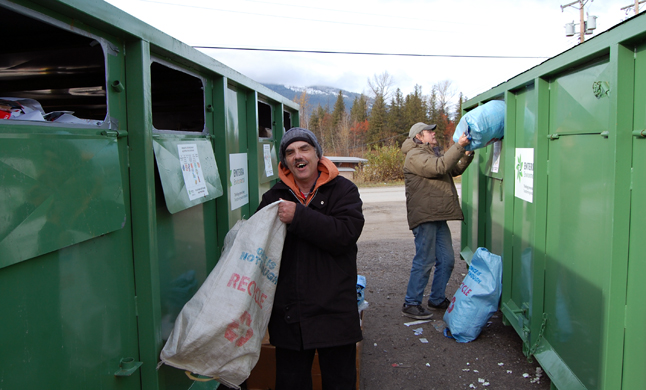
Editor’s Note:
In this series dedicated recycler and volunteer Barb Little will discuss the Columbia Shuswap Regional District’s focus on Zero Waste, its plans for curb-side pick up for Revelstoke in 2010, composting, Extended Producer Responsibility, the Revelstoke Recycling Directory and alternatives like the Hornby Island Free Store. She will also feature some local recycling superstars, explain the Mechanical Sort Facility and clarify what exactly can — and cannot — be recycled.

Our throwaway, out-of-sight-out-of-mind culture annually produces tons of unwanted stuff. We are drowning in non-repairable junk and outmoded technology. Islands of plastic debris float in our oceans.
Recycling has become a mantra as many go green, embracing recycling and composting as alternatives to landfills. It may seem contradictory but an eyesore of recyclables spewing out of the new all-in-one bins and heaped between them at a recent Hazardous Waste Fair is, in fact, a success story.
For months Revelstokians stockpiled plastics that could not be regularly recycled. Recently we learned that plastics graded 1, 2, 4 and 5 would be accepted daily into a mixed stream. A flood of cans, glass, paper and plastic quickly filled the one bin provided. There are two now, more may be needed.
I was there that day as a NCES volunteer to assist the public. There was confusion about what kind of plastics were accepted, complaints about the mess and comments like “There’s no way they’ll be able to separate that jumble, it’ll go to the dump!”
A seasoned recycler, I too was confused and upset by the state of affairs. Looking for answers I called Carmen Fennell, Waste Reduction Facilitator for the Columbia Shuswap Regional District (CSRD) and visited their impressive website. The recycling story is complicated with many players. I came away with more questions needing answers.
“It’s certainly not ending up in landfill, absolutely not!” said Fennell. “Why would we spend $10,000 on a specialty bin, and go to all the trouble?”
The CSRD wants us to radically rethink what we call garbage and what we do with it.
“The 3 Rs are out, it’s the 6 Rs now and recycling is down the list. The focus shouldn’t be on recycling or which plastics are accepted.” Fennell explained.
Rethinking is now the first R, followed by Reduce, Reuse, Recycle, Recover and Manage Residual. Garbage is now solid waste. The Dump is now the Resource Recovery Centre. The goal – achieving Zero Waste. Wow.
That pretty much describes the 1950s. Our moms were the original recyclers. Plastic bags weren’t in daily use, paper was used sparingly — we had cloths not paper towels, everything was repaired, reused or given away. My mother sewed my coats out of her discards. A drawer full of used string, rubber bands, tin foil, safety pins, paper bags, buttons, wax paper, zippers and more ensured she’d never buy those items again.
My father used elbow grease to power the lawnmower, grew vegetables (which mother canned in glass jars), put all organic waste into two huge wood compost bins, walked to work and only ‘went for drives’ with the family on Sundays.
That’s kinda where the CSRD wants us to get to. A place where we consume less and rethink what we buy before it ends up at the landfill. Fennell said solid waste is now considered a resource. Extrapolate that and you have third world villages living on what they extricate from dumps.
When asked about CSRD’s Five Year Plan Fennell explained, “All decisions will be based on a Zero Waste Approach, reducing consumption, minimizing waste, maximizing recycling and ensuring products are made to be reused, repaired or recycled back into nature or the marketplace.”
Whoa, that’s a tall order! They’ll need us on board to make it happen but unfortunately many people don’t recycle, not even refundable containers. Too much trouble! What difference does it make?
As we shall see it can make a great deal of difference.



